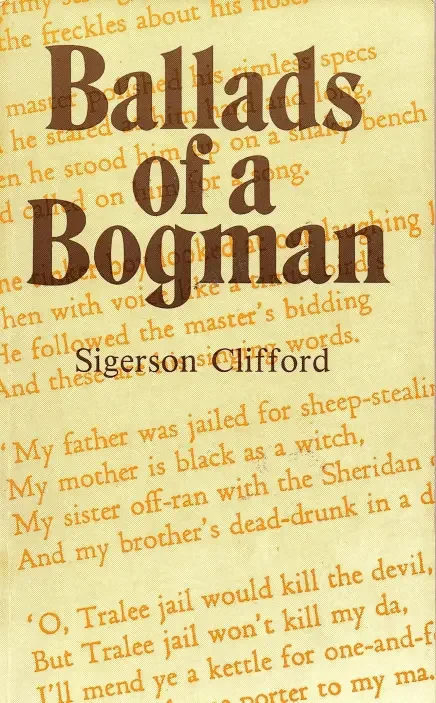Sigerson Clifford
Clifford, Sigerson (1913–85), author, was born Edward Bernard Clifford on 8 May 1913, at Dean St., Cork, son of Michael Clifford, tailor, and Mary Anne Clifford (née Sigerson), both of Caherciveen, Co. Kerry. The family returned to Caherciveen when he was two, and he was educated at the local Christian Brothers national and secondary schools. For a period he lived with his grandfather Edward (‘Ned’) Sigerson, a noted local story-teller, who was a formative influence, introducing him to much of the folklore and oral culture of south Kerry. He was a bookish boy and began writing in his early teens, at first under the Irish version of his name, Éamonn Ó Clubhain, but later settling upon a combination of his parents' surnames. At 19 he joined the civil service, entering the Department of Social Welfare. He worked in various employment exchanges around the country, including Dungloe and Caherciveen, before permanently transferring to Dublin (1943). It was during his stint in Caherciveen that he wrote his first play, ‘The policeman's paradise’, a gentle send-up of the lack of local activity during the war of independence. This was typical of his literary output in that it was almost exclusively focused on Kerry, and the Iveragh peninsula in particular.
Initially poetry was his favoured genre and he produced a number of volumes, among them Travelling tinkers (1951), the first publication by Dolmen Press, and Ballads of a bogman (1955). The latter was extremely popular; its poems, such as ‘I am Kerry’ and ‘The ghost train to Croke Park’, dwelt on the attractive themes of landscape, place, people, and rural culture. Although capable of some striking images, much of this work is very uneven, and he soon began to focus on prose. In total he wrote eleven plays, most of which were performed on the amateur circuit, but his drama on Daniel O'Connell (qv), ‘The great pacificator’, did receive a two-week run in the Abbey (1947). His short stories were read on Radio Éireann and published in The Kerryman, Evening Press, and Irish Press; a collection of these, The red-haired woman and other stories, was published posthumously (1989). He retired in 1973, dying suddenly (1 January 1985) at his home in Glenageary, Co. Dublin. His remains were brought to Caherciveen for burial.
He married (1945) Sheila (Marie) Eady, typist, of Cork; they had five sons and two daughters.
Sources
DOI: https://doi.org/10.3318/dib.001751.v1
Programme of Abbey production of ‘The great pacificator’ (1947); Abbey plays 1899–1948 (1949); Sigerson Clifford, Sigerson Clifford's book of Irish recitations (1950); W. McLysaght and Sigerson Clifford, Death sails the Shannon (1953); Sigerson Clifford, Ballads of a bogman (1955); Sigerson Clifford and T. Crofton Croker, Legends of Kerry (1972); Cleeve; Kerryman, 11 Jan. 1985; Sigerson Clifford, The red-haired woman and other stories (1989)
Lament for Sigerson Clifford
I am Kerry
I am Kerry like my mother before me,
And my mother's mother and her man.
Now I sit on an office stool remembering,
And the memory of them like a fan
Soothes the embers into flame.
I am Kerry and proud of my name.
My heart is looped around the rutted hills,
That shoulder the stars out of the sky,
And about the wasp-yellow fields,
And the strands where kelp-streamers lie;
Where, soft as lovers' Gaelic, the rain falls,
Sweeping into silver the lacy mountain walls.
My grandfather tended the turf fire,
And, leaning backward into legend,spoke,
Of doings old before quills inked history.
I saw dark heroes fighting in the smoke,
Diarmuid dead inside his Iveragh cave,
And Deirdrie caoining[keening] upon Naoise's grave.
I see the wise face now with its hundred wrinkles,
And every wrinkle held a thousand tales,
Of Finn and Oscar and Conawn Maol,
And sea-proud Niall whose conquering sails,
Raiding France for slaves and wine,
Brought Patrick to mind Milchu's swine.
I should have put a noose about the throat of time,
And choked the passing of the hob-nailed years,
And stayed young always, shouting in the hills,
Where life held only fairy fears,
When I was young my feet were bare,
But I drove cattle to the fair.
'Twas thus I lived, skin to skin with the earth,
Elbowed by the hills, drenched by the billows,
Watching the wild geese making black wedges,
By Skelligs far west and Annascaul of the willows.
Their voices came on every little wind,
Whispering across the half-door of the mind,
For always I am Kerry...
Sigerson Clifford








